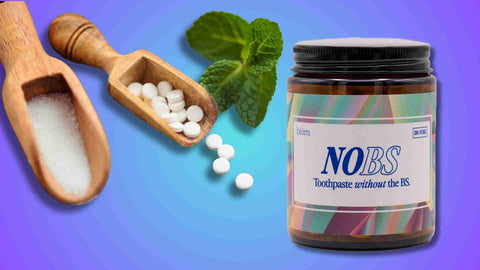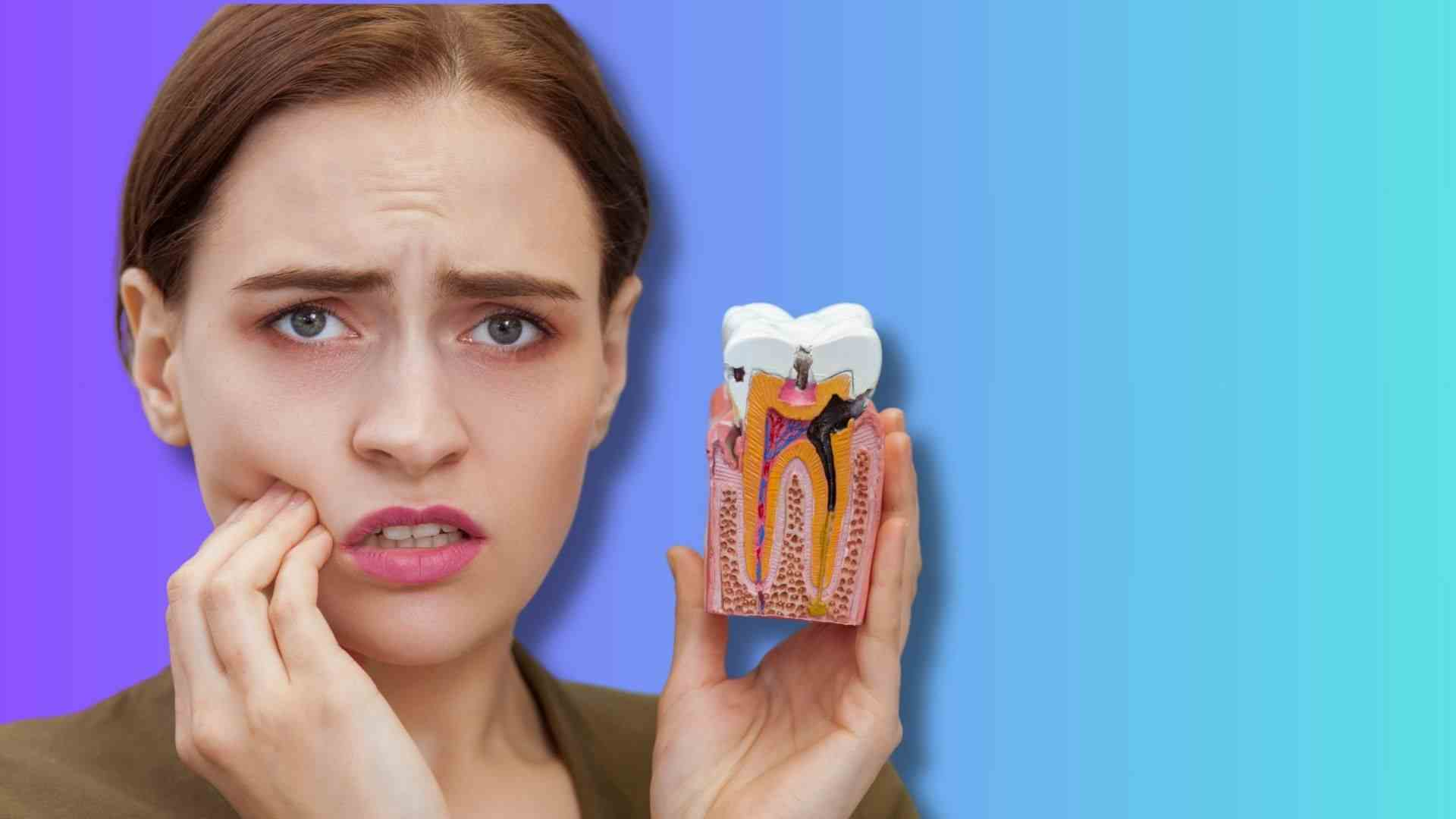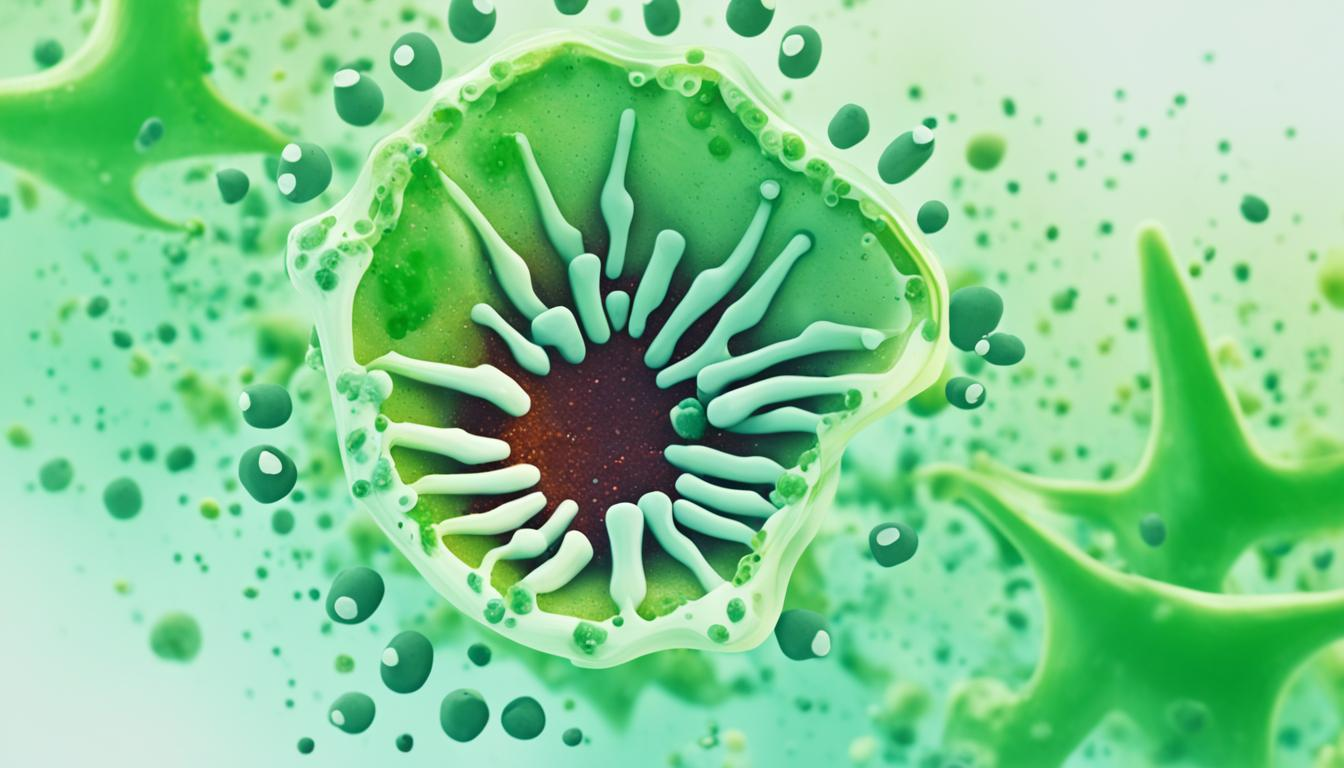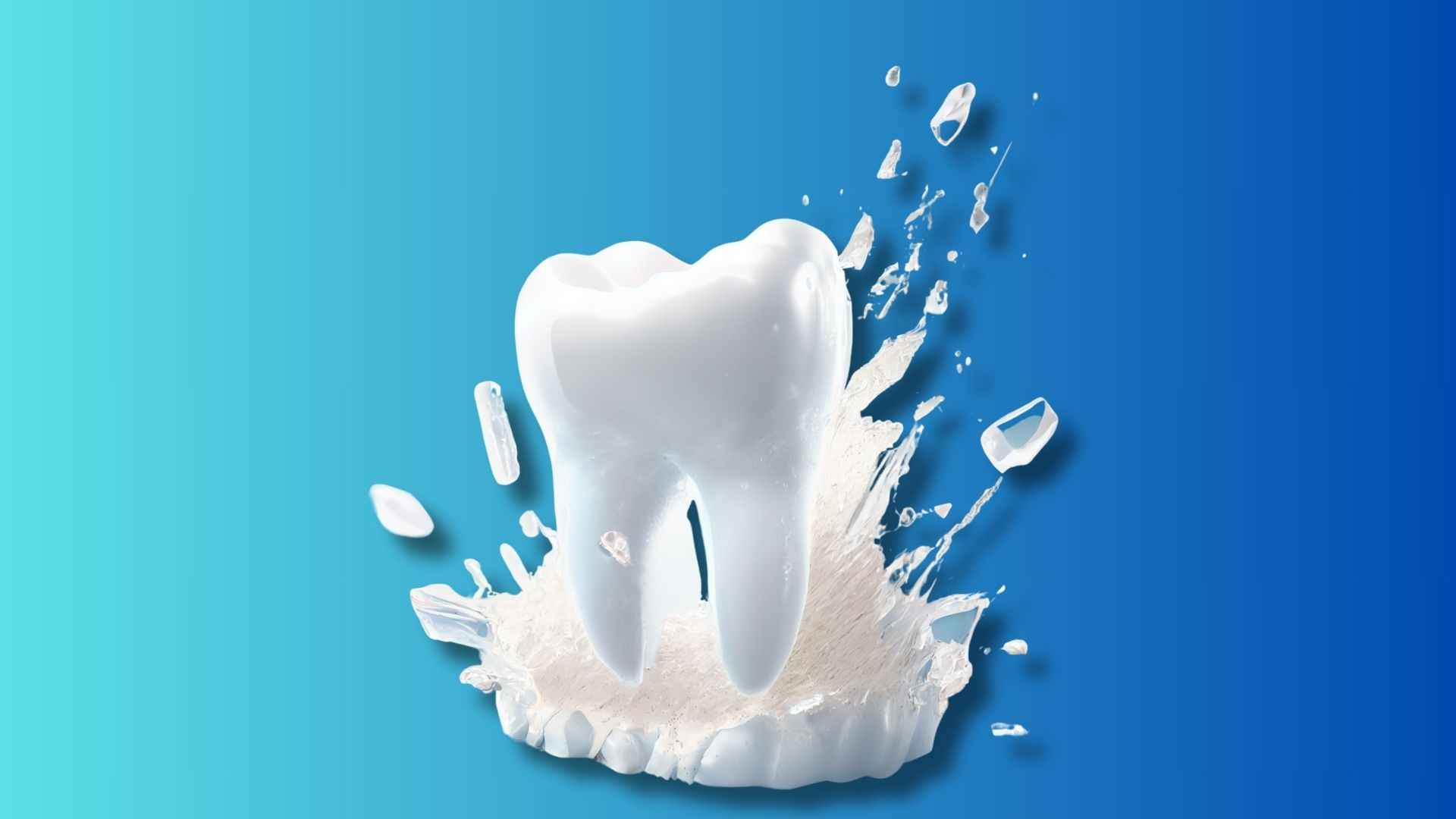Does Hydroxyapatite Heal Cavities?
While cavities cannot be remineralized after they've already formed, hydroxyapatite can reverse initial caries lesions, also known as the initial stages of demineralization and tooth decay.
This remineralization can take as little as 8 weeks.
Essentially, hydroxyapatite toothpaste can effectively deposit calcium and phosphate ions onto the tooth surface, promoting the formation of new hydroxyapatite crystals and strengthening enamel.
This process is known as remineralization, and it helps repair microscopic areas of demineralization before they progress into cavities, making your enamel more resistant to acid erosion and decay.
While hydroxyapatite toothpaste shows promise in promoting enamel remineralization and preventing cavities, its effectiveness may vary depending on the severity and extent of tooth decay.
In cases of advanced cavities where the enamel has been significantly compromised, professional dental intervention such as fillings or other restorative treatments may be necessary to restore the tooth's structure and function.
In this article, I'll explain everything you need to know about cavities and whether you can use hydroxyapatite to heal them.
First, what causes cavities?

Cavities, also known as dental caries, are common dental problems characterized by structural damage to the teeth. In fact, the World Health Organization reports they're the most common disease in the world!
Cavities form due to a complex interplay of different factors within your oral microbiome.
You see, we all have harmful bacteria naturally present in our mouths that form a sticky film called "dental plaque" on our teeth. When we consume sugary foods or acidic fruits, for example, the bacteria feed on the sugars and then produce acid as a byproduct.
Then, the acid produced attacks our enamel, initiating a process that we call demineralization. Over time, demineralization leads to the initial stage of cavity formation which can result in the development of small openings in our enamel.
The openings get progressively larger and eventually penetrate deeper into the tooth, causing symptoms like sensitivity and discomfort.
To reverse tooth decay, we use tools like nano hydroxyapatite toothpaste to stimulate a process called remineralization (aka the opposite of demineralization).
What is hydroxyapatite toothpaste?

Hydroxyapatite (also referred to as simply "HA") is a naturally occurring mineral that is the primary inorganic component of human teeth and bones.
It is a crystalline structure composed of calcium and phosphate ions, making it a vital component of the hard tissues in our bodies. In fact, hydroxyapatite gives our teeth and bones their strength and hardness.
In the context of teeth, hydroxyapatite is a key component of tooth enamel, which is the outermost layer of the tooth surface. Enamel is the hardest substance in the human body, and it protects the underlying dentin and pulp of the tooth.
Hydroxyapatite is also used in various dental and medical applications, including dental implants, bone grafts, and as a biomaterial in orthopedic surgery.
Further, hydroxyapatite toothpastes, have restorative properties that are not limited to its protective barrier alone; it also contributes significantly to the remineralization process, aiding in the repair of microscopic enamel imperfections that are otherwise invisible to the naked eye.
How does hydroxyapatite toothpaste work?
Because it is made of the same materials as your teeth, nano hydroxyapatite toothpaste works to prevent tooth decay by filling in your enamel with calcium and phosphate. This is a process known as remineralization.
A standard diet high in acid and sugar will slowly eat away at your enamel. Without intervention, your enamel erodes, and cavities form.
Dental experts use nano hydroxyapatite toothpaste to prevent this erosion through a process called remineralization and to improve your oral health overall.
Can hydroxyapatite toothpaste remineralize teeth?
Yes, hydroxyapatite does remineralize teeth. When hydroxyapatite is used in toothpaste or other oral care products, supports the mineral restoration of our enamel through remineralization.
This remineralization process makes enamel stronger and more resistant to acid erosion. It can even reverse tooth decay. At a high level, hydroxyapatite repairs and strengthens the outer layer of your teeth, which is vital for preventing demineralization, enamel erosion, and tooth decay.
The remineralization effect of hydroxyapatite is one of the main reasons it is used in dental products, particularly in toothpaste, alongside its ability to soothe hypersensitivity and whiten teeth.
In comparing hydroxyapatite vs nano hydroxyapatite, nano hydroxyapatite is shown to have greater remineralization potential than hydroxyapatite.
Further, studies show that when comparing nano hydroxyapatite vs fluoride, nano hydroxyapatite toothpaste is equally as effective at remineralization as fluoride toothpaste.
Benefits of Hydroxyapatite Toothpaste
Hydroxyapatite toothpaste tablets are making waves for all of the incredible benefits they offer for your teeth. Here in this section, we'll explore some of the most important ones.
Promotes Enamel Remineralization
Studies show that hydroxyapatite toothpaste promotes dental enamel remineralization, effectively repairing and strengthening your tooth enamel.
This natural mineral compound is able to reverse early enamel erosion and fight tooth decay by replenishing essential minerals, such as calcium and phosphate.
In fact, in comparing hydroxyapatite vs fluoride, hydroxyapatite toothpaste is scientifically proven to be just as effective as fluoride at remineralizing teeth.
Soothes Hypersensitivity
Hydroxyapatite toothpaste has the ability to soothe tooth sensitivity.
This toothpaste works by creating a protective layer over the exposed dentin, which reduces the transmission of external stimuli to the nerve endings, thereby lessening the pain associated with tooth sensitivity.
Plus, it can greatly enhance your ability to tolerate acidity, temperature, and sugar, ultimately improving the overall oral health and quality of life if your having dentin hypersensitivity.
Prevents Tooth Decay

Research indicates that hydroxyapatite does indeed help prevent tooth decay.
It works by inhibiting plaque-causing bacteria and remineralizing initial caries lesions, making it an effective option for preventing tooth decay.
Compared to fluoride toothpaste, hydroxyapatite toothpaste offers a natural alternative for preventing tooth decay. It provides similar cavity prevention benefits without the potential side effects of fluoride.
Fights Plaque-Causing Bacteria
Studies indicate that hydroxyapatite toothpaste acts as a natural defense against plaque-causing bacteria, helping to prevent the formation of oral biofilm.
Unlike fluoride, hydroxyapatite has unique antibacterial properties. By selectively killing off certain strains of bacteria that disrupt your mouth, hydroxyapatite protects your teeth and gums.
Additionally, hydroxyapatite disrupts biofilm, thereby reducing your risk of developing demineralization and gum issues.
Naturally Compatible With Your Teeth
Another remarkable benefit of hydroxyapatite toothpaste is its natural compatibility with your teeth.
Because the composition of hydroxyapatite closely resembles the minerals found in tooth enamel, it provides your teeth with the necessary minerals making it an ideal choice for maintaining healthy enamel.
Plus, unlike other toothpaste options, hydroxyapatite does not introduce foreign substances to your teeth.
Safe Alternative to Fluoride

If you are aware of the potential risks associated with fluoride, studies have shown that hydroxyapatite toothpaste provides a safe and effective alternative.
Fluoride toothpastes have been widely used for decades to prevent tooth decay. However, research indicates that excessive fluoride consumption, especially during early childhood, can lead to dental fluorosis and toxicity.
Hydroxyapatite toothpaste, on the other hand, does not contain fluoride, but offers comparable efficacy in reversing tooth decay, strengthening the teeth, and inhibiting the growth of plaque-causing bacteria.
Fights the Development of Dental Caries

Hydroxyapatite toothpaste offers an effective solution in the fight against dental caries.
Through its unique composition, this toothpaste can remineralize and strengthen your weakened tooth structures, effectively combatting caries lesions and preventing further damage.
This preventive dentistry approach is particularly valuable in reducing the risk of tooth loss and the need for extensive dental treatments. By using hydroxyapatite toothpaste regularly, you can actively support your oral health and protect your teeth from the harmful effects of dental caries.
However, please note that while the literature shows hydroxyapatite can reverse demineralization, it cannot reverse a cavity once the cavity has been formed.
Promotes Good Oral Health
Hydroxyapatite toothpaste promotes good oral health by addressing various dental concerns effectively.
Studies have shown that hydroxyapatite enhances enamel remineralization, strengthens tooth structure, and inhibits the growth of plaque-causing bacteria.
It has natural antibacterial properties that contribute to a healthier oral environment, reducing the risk of gum disease and other oral infections.
Therefore, by incorporating hydroxyapatite toothpaste into your daily oral care routine, you can effectively protect your gums, prevent oral diseases, and maintain strong, healthy teeth.
Brightens Teeth
Hydroxyapatite toothpaste also offers the benefit of brightening teeth through its gentle and effective stain removal properties.
In vitro study states that hydroxyapatite toothpaste effectively removes surface stains from teeth, resulting in a brighter and whiter smile.
Unlike abrasive whitening toothpaste that may contain SLS and can cause enamel damage, hydroxyapatite toothpaste gently polishes the teeth, revealing their natural brightness without compromising enamel integrity.
This fluoride-free toothpaste is an excellent option for people with sensitive teeth who may experience discomfort or sensitivity when using traditional whitening products. Further, many whitening toothpastes are not safe during pregnancy, which may make hydroxyapatite toothpaste a compelling option.
To experience the brightening effects of hydroxyapatite toothpaste, incorporate it into your daily oral care routine. Brushing your teeth twice a day with this natural toothpaste can help you achieve a radiant smile while promoting overall oral health.
Stabilizes Your Oral PH
Hydroxyapatite toothpaste offers the distinct advantage of stabilizing your oral pH, contributing to a healthier mouth environment.
Research indicates that hydroxyapatite is resistant to acid, allowing it to effectively buffer the pH levels in your mouth. This means that even when acidic substances are consumed, such as citrus fruits or carbonated beverages, hydroxyapatite can help maintain a more neutral pH, reducing the risk of enamel erosion and promoting overall oral health.
By stabilizing your oral pH, hydroxyapatite toothpaste aids in preserving tooth enamel and minimizing the likelihood of dental issues like cavities and tooth sensitivity.
Therefore, incorporating hydroxyapatite toothpaste into your oral care routine can lead to a more balanced and resilient oral environment, supporting long-term dental wellness.
Fluoride Toothpaste vs. Hydroxyapatite for Cavities
While only fluoride is approved by the American Dental Association for preventing cavities, studies suggest that both hydroxyapatite and nano hydroxyapatite are equally as effective as fluoride at remineralization.
Hydroxyapatite has been shown to remineralize enamel, strengthen teeth, and inhibit the growth of bacteria in the mouth, making it a promising alternative or adjunct to fluoride-based oral care products.
Some studies also indicate that hydroxyapatite toothpaste is as effective as fluoride toothpaste in reducing the formation of plaque and preventing tooth decay.
Finally, another study using the International Caries Detection and Assessment System concluded, at the end of a year-long trial, that hydroxyapatite toothpaste was not inferior to fluoride control toothpaste.
Is hydroxyapatite toothpaste safe?
Yes, hydroxyapatite, alongside its smaller cousin nano hydroxyapatite, is safe to use in toothpaste. In fact, research indicates that nano hydroxyapatite toothpaste may have fewer safety concerns compared to fluoride toothpaste.
Nano hydroxyapatite particles and hydroxyapatite particles do not induce toxicity the way overconsumption of fluoride can. This is particularly important for certain populations such as:
-
pregnant women
-
children
-
people prone to tooth decay and cavities
-
people who live in environments with high fluoride concentrations in the water
This is likely because nano hydroxyapatite particles are biomimetic and safe as they are already a substance naturally present in our teeth, which makes them less likely to cause any harm when use.
Therefore, choosing nano hydroxyapatite toothpaste tablets can be your ideal step toward a safer and more effective oral care routine.
How long does hydroxyapatite take to work?
Nano-hydroxyapatite (nHA) can start promoting enamel remineralization in as little as 8 weeks with consistent use.
Studies suggest that nHA works by filling in microscopic cracks and rebuilding the mineral matrix of tooth enamel. This process strengthens teeth, reduces sensitivity, and helps protect against cavities over time.
Research indicates that noticeable improvements, such as reduced sensitivity and smoother enamel, can occur within the first few weeks of use. However, the exact timeline may vary depending on factors like the severity of enamel damage and oral hygiene habits.
Continued use of nHA toothpaste is recommended for long-term benefits, as it can also prevent demineralization. To maximize results, it's best to pair nHA with proper brushing, flossing, and regular dental checkups.
Overall, nHA is an effective and fluoride-free option for improving oral health.
Other Tips for Preventing Cavities

Using hydroxyapatite-based toothpaste isn't the only way to remineralize teeth.
Maintaining strong and healthy teeth requires a combination of good oral hygiene practices and lifestyle choices. Here are some additional tips to promote strong, healthy teeth:
Brush With Nano Hydroxyapatite Toothpaste
We recommend brushing your teeth with nano hydroxyapatite toothpastes twice daily for 2 minutes.
Nano hydroxyapatite toothpaste contains tiny particles of a mineral naturally found in teeth and bones.
Thus, brushing with nano hydroxyapatite toothpaste tablets helps strengthen enamel by depositing nano hydroxyapatite particles onto tooth surfaces. These particles bond with enamel, fill in minor surface defects, and promote remineralization.
Use Expandable Floss at Least Three Times per Week
Flossing is essential for removing food particles and plaque from between your teeth and along the gumline, where your toothbrush may not be able to reach.
Expandable floss is designed to expand and adapt to the contours of your teeth, providing thorough cleaning. We recommend flossing at least three times per week (although preferably daily) to prevent prevent plaque buildup and reduce your risk of gum disease.
Limit Acidic Foods in Your Diet
As discussed earlier, acidic foods and beverages, such as citrus fruits, carbonated sodas, and certain sauces, can weaken tooth enamel and contribute to enamel erosion over time.
Limiting your consumption of acidic foods helps reduce the risk of acid-related enamel damage. If you do consume acidic items, consider rinsing your mouth with water afterward or using an alkaline mouthwash to help neutralize acids and minimize their effects on your teeth.
Use Alcohol-Free Mouthwash
Alcohol-free mouthwash can be a gentler choice for oral care. Alcohol-based mouthwashes can sometimes lead to dry mouth, which can increase the risk of dental issues.
An alcohol-free mouthwash can help freshen your breath, reduce the growth of harmful bacteria, and provide additional support for your oral hygiene routine without causing dryness.
Plus, you can use alcohol free mouth everyday, and it's safe for kids to use too.
See Your Dentist at Least Once a Year
Regular dental check-ups are crucial for maintaining good oral health. It's recommended to visit your dentist at least once a year for a comprehensive examination and professional cleaning.
During these visits, your dentist can detect any potential dental issues early, provide personalized oral health recommendations, and ensure that your oral hygiene routine is effective.
By staying proactive with your dental care and seeing your dentist regularly, you can help prevent cavities and other dental problems in the long run.
Summary: Does hydroxyapatite fix cavities?
All in all, hydroxyapatite does not fix cavities once they've formed. However, it can remineralize teeth and prevent tooth decay from occurring in the first place.
By incorporating hydroxyapatite into your oral hygiene routine, you can strengthen enamel and potentially slow down the progression of early-stage cavities.
Additionally, hydroxyapatite offers a safe and well-tolerated alternative to fluoride, making it suitable for individuals with specific sensitivities or concerns.
Ultimately, its effectiveness depends on consistent use. It's best to use it regularly to see results, but if you have extensive cavities, it's better to consult your dentist for appropriate treatment.
Frequently Asked Questions
Does hydroxyapatite heal deep cavities?
Hydroxyapatite may help remineralize tooth enamel and potentially slow down the progression of early cavities. However, its effectiveness in healing deep cavities is limited. Deep cavities typically require professional dental intervention, such as fillings or other restorative treatments, to remove decayed tissue and restore the tooth's structure. While hydroxyapatite can be beneficial for maintaining oral health and preventing cavities, it's not a substitute for advanced dental care when dealing with deep cavities. Regular dental check-ups and prompt treatment by a dentist are crucial for addressing deep cavities effectively.
How long does hydroxyapatite take to work?
Hydroxyapatite can begin working immediately upon use, especially in oral care products like toothpaste or mouthwash. Its ability to integrate with tooth enamel and potentially remineralize damaged areas can provide some immediate benefits, such as strengthening enamel and reducing tooth sensitivity. However, for more significant issues like deep cavities, the full effects may take longer to become apparent, requiring consistent use over time. Nonetheless, the immediate benefits of hydroxyapatite can contribute to overall dental health from the moment it's used.
Can remineralization reverse cavities?
Remineralization can reverse the early stages of cavities by restoring minerals to the enamel and strengthening its structure. In some cases, if the decay has not progressed too far, remineralization techniques, such as using products containing fluoride or hydroxyapatite, along with good oral hygiene practices, may help reverse the cavity formation process. However, once a cavity has progressed beyond a certain point, remineralization alone may not be sufficient, and professional dental intervention, such as fillings, may be necessary to restore the tooth's integrity. Regular dental check-ups are essential to monitor the progression of cavities and determine the appropriate course of treatment.
What are the negatives of hydroxyapatite toothpaste?
Hydroxyapatite toothpaste typically doesn't have significant negative effects and, in fact, offers numerous benefits for oral health. Unlike some traditional toothpaste ingredients like fluoride, hydroxyapatite is generally considered safe and well-tolerated by most individuals. It can help remineralize tooth enamel, reduce tooth sensitivity, and promote overall oral health without the risk of fluorosis or other potential side effects associated with fluoride overuse. Additionally, hydroxyapatite toothpaste is often free from harsh abrasives and artificial additives, making it suitable for those with sensitive teeth or gums. Overall, while individual sensitivities may vary, hydroxyapatite toothpaste is generally regarded as a safe and effective option for maintaining oral hygiene.
Can tooth decay cause bad breath?
Yes, tooth decay can cause bad breath. When cavities form, bacteria break down food particles, producing foul-smelling compounds. The decayed tooth material can also harbor these bacteria, worsening the odor. Proper dental care and treatment of cavities can help eliminate bad breath caused by tooth decay.
Can I use hydroxyapatite toothpaste every day?
Yes, you can use hydroxyapatite toothpaste every day as part of your regular oral hygiene routine. It's formulated to be gentle yet effective for daily use, helping to remineralize tooth enamel, reduce sensitivity, and maintain overall oral health. Using hydroxyapatite toothpaste consistently can contribute to stronger teeth and better cavity protection.
Can you reverse cavities with hydroxyapatite?
Yes, hydroxyapatite can help reverse early-stage cavities by promoting remineralization of weakened enamel. Nano-hydroxyapatite fills microscopic cracks and restores lost minerals, strengthening the tooth's structure and preventing further decay. However, for advanced cavities, professional dental treatment is necessary as remineralization alone may not suffice.
How do I know if a cavity is remineralizing?
You can often tell if a cavity is remineralizing by observing signs such as a reduction in tooth sensitivity or the appearance of a smoother surface on the affected tooth. Early-stage cavities may show a less noticeable discoloration or the return of a glossy, hard texture as remineralization occurs. Regular dental checkups and X-rays can also help confirm if a cavity is improving, as your dentist will monitor enamel changes over time.























